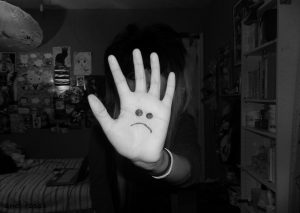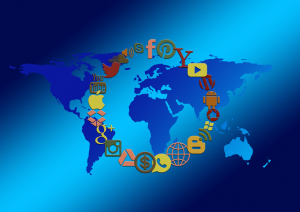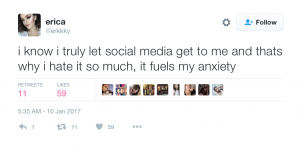Is your online addiction getting too much for you? There is a constant feeling of self-consciousness or a need for perfectionism, which can arise from social media platforms. This normally manifests itself into social anxiety, or leading to pervasive thoughts indicative of Obsessive-Compulsive Disorder (OCD). This results from the over-use of social media and the constant need to check it, and the negative affects it has on individuals can continue, like a negative cycle…
The ‘obsessive’ use of scrolling up and down social media sites, allows people to boost and show the world what they are up to. Whether it be going on an exciting holiday, a picture of the night before, or even something simple to show off a new outfit they have bought. People are bound to react to these different posts. You can question yourself as to why you don’t have this lifestyle or the money to afford particular luxuries, or why you are not a size 0 like the typical and ‘perfect’ Instagram or Tumblr girls?

Compare and Despair?
Comparing can also lead to anxiety when it relates to followers and likes you can receive on your profile. For example, teens using Instagram, Twitter, and Facebook have indicated that it is more about quantity rather than quality. They would prefer to have “randomers” following them, but as long as they have hundreds, even thousands of followers, they don’t care. This is not only regarding the quantity of your followers, but also re-tweets, and “likes” you can receive on a post.
Users can take these obscure numbers, and twist them to support negative thoughts. Some can constantly be checking to see how many followers or likes they are going up by, and feel upset and anxious if it not high enough. Or similar to this, if a close friend or someone you’re envious of, tends to have more than you. This act of ‘compare and despair’ goes round like a vicious and negative cycle… all because of the ‘dark wide web’.

Another social anxiety triggered by online media is the ‘Fear Of Missing Out’ (FOMO). Pictures of a party where you were not invited to, or when photos arise of your friends meeting up and you not being able to be with them. It can take a toll on an individuals’ self esteem and self consciousness, leading to you feeling anxious, as you sit looking at what you are missing out on.
According to the research from ‘Digital Trends’ it has become apparent that the ‘pressure to be available 24/7’ and the perceived necessity of responding to text messages or posts from social media immediately, is also helping to increase anxiety dramatically. It sounds ridiculous, as people (especially the younger generation), in todays society, are more reachable and plugged in than ever. This is with social media platforms improving, and the need to have the newest and greatest smart phone, like everyone else. However, it comes at a high cost and the amount you unlock your phone to check social media is outrageous.
Anxiety Current Studies:
On ‘Psych Central’ website, they conducted a couple of studies to determine how social media accounts can affect an individuals’ anxiety, self consciousness and ‘online obsession’. The first study looked into the association between a person’s self esteem and how much time this individual spent on maintaining their profile, to make it the best they can, for their followers to look upon. It concluded that those with lower self-esteem cared more about what others had posted about them on Facebook specifically, and were more likely to remove certain posts (for example, photos that you’ve been tagged in). This is to ascertain that the ‘correct image’ of themselves is kept on their profile, and that the correct reflection has been portrayed of themselves.
This is the same for other social media accounts, like Instagram too. However, those with higher self esteem spend more time creating their profile and adding photos and current information about themselves, to build up the ‘ultimate persona’, to make them look good and presentable for their followers.

Another study also showed that Facebook can increase people’s anxiety levels by making them feel inadequate and generates excess and unnecessary worry and stress. By Facebook providing constant updates, and the motivation to constantly check these updates, and only feeling relief when they turn off their mobile device or laptop. In this study, it corresponds to over half of the respondents to state that they felt uneasy when they were unable to access their social media, or even their email accounts.
What was the world like before social media existed, I wonder?
Below, is a video that was made by Harshil Patel, on how he overcame his social media anxiety. He explains how he overcame his negative thoughts and worrying what people thought of him, and began to come out of his comfort zone. He did this for the sake of his own mental growth, and posted this video in order to help people with similar anxiety problems: